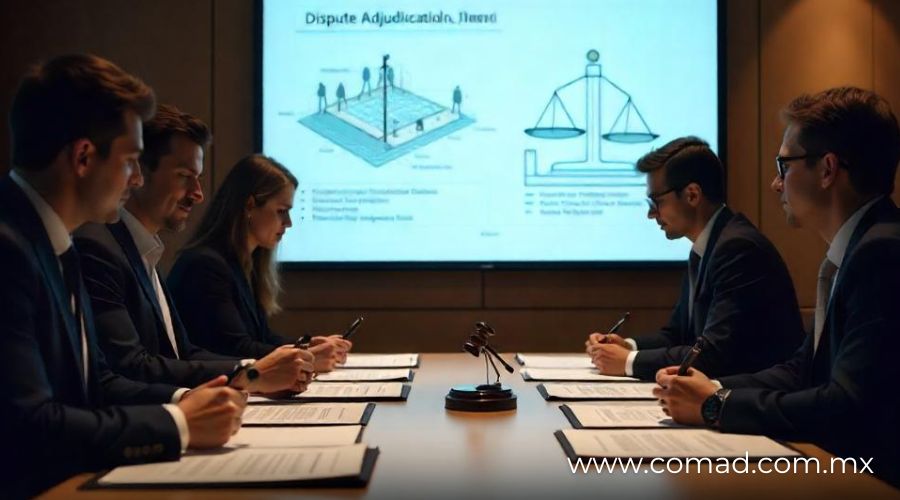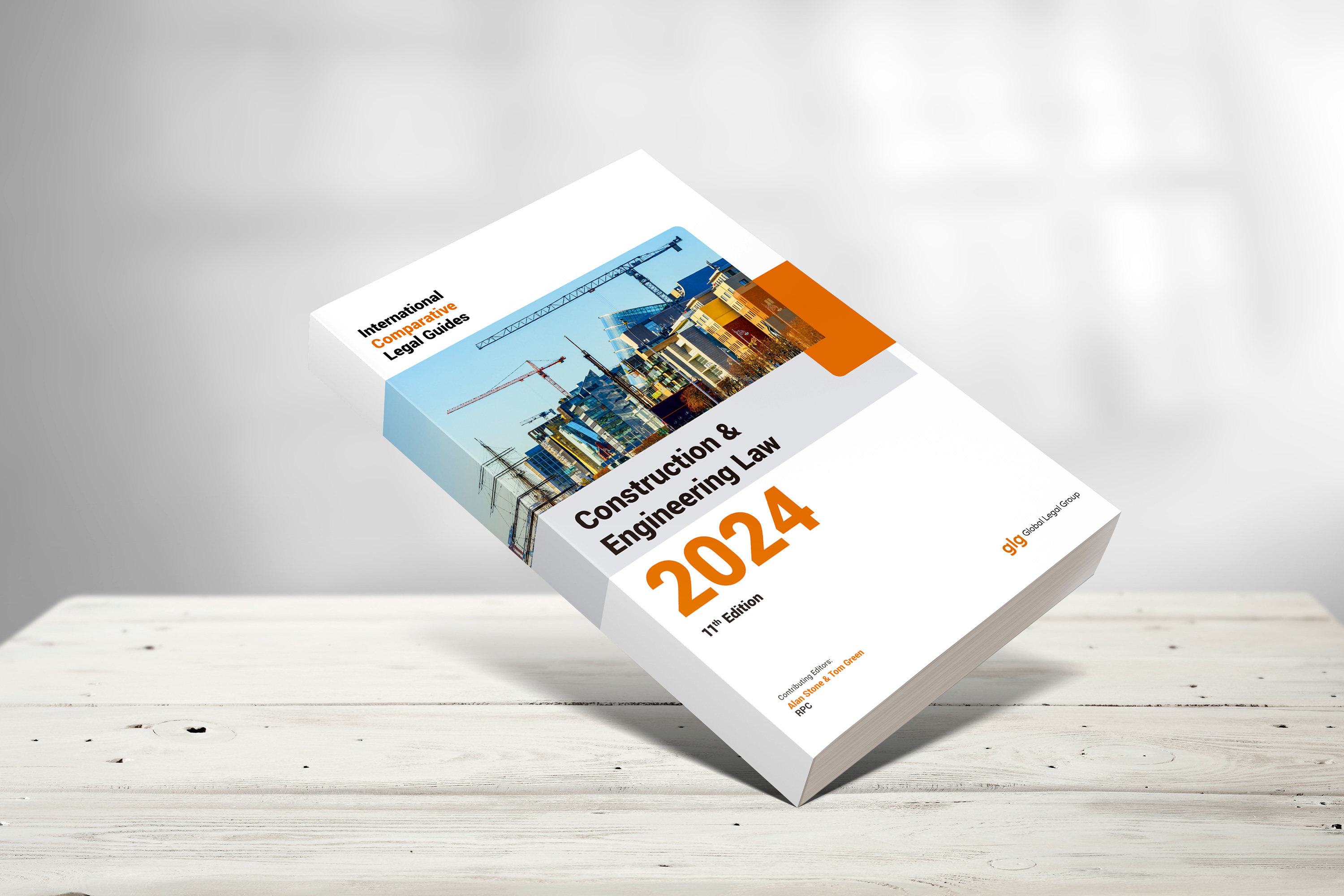COMAD BLOG
Construcción y Ley: Expertos en Derecho de la Construcción
Non-Compliance of Dispute Adjudication Boards’ Decisions: How Expedited Arbitration Can Help

Non-Compliance of Dispute Adjudication Boards’ Decisions: How Expedited Procedure Rules in Arbitration May Help to Solve the Matter
By Roberto Hernández-Garcia
Introduction
In construction projects, Dispute Adjudication Boards (DABs) serve as an effective mechanism for resolving disputes quickly during the execution of a project. However, a significant problem arises when the party required to comply with the DAB’s decision (often the losing party) refuses to do so. Here is a detailed analysis of the problem, consequences, and potential solution through expedited arbitration.
Problem Description
1. Non-Compliance with DAB Decisions
The fundamental issue is that the DAB’s decision, although binding in the interim, may not be complied with voluntarily by the losing party. Non-compliance can lead to ongoing disputes and potential project disruptions.
2. Need for Enforcement
The party in favor of the DAB decision often has to seek enforcement through arbitration or court proceedings. This can be a lengthy and costly process, undermining the expediency that DABs aim to provide.
3. Delay in Resolution
Traditional arbitration to enforce DAB decisions can significantly delay project timelines, as arbitration procedures can be lengthy, thus negating the immediate benefit provided by the DAB’s initial resolution.
4. Increased Costs
Prolonged arbitration processes can increase legal and administrative costs, burdening the parties and potentially impacting the financial health of the project.
Consequences
1. Project Delays
Delay in resolving disputes can lead to extended project timelines, affecting delivery dates and possibly incurring penalties for late completion.
2. Strained Business Relationships
Prolonged conflict can strain relationships between contracting parties, affecting current and future collaboration.
3. Cash Flow Issues
The party entitled to payment or performance based on the DAB’s decision may face cash flow issues, affecting its ability to continue project activities or meet other financial obligations.
4. Undermining of DAB Effectiveness
Frequent non-compliance with DAB decisions may erode trust in this dispute resolution method, discouraging its use and leading to a reliance on more adversarial and time-consuming processes.
Potential Solution: Expedited Arbitration
Inclusion of Expedited Arbitration Clauses
By incorporating a clause in the contract allowing expedited arbitration, parties can ensure that disputes related to DAB enforcement are resolved more quickly. This involves structured timelines and streamlined procedures that reduce the overall duration of arbitration.
Benefits of Expedited Arbitration
- Shortened Process: Fast-tracking the arbitration process can lead to resolutions in shorter time frames, preserving project timelines.
- Reduced Costs: With a quicker procedure, the costs associated with resolution can also be minimized.
- Encouragement of Compliance: The threat of swift enforcement may encourage parties to honor DAB decisions, knowing that noncompliance will lead to expedited legal action.
- Maintaining Project Momentum: Quick resolutions help maintain the momentum of the project, avoiding unnecessary halts and resource misallocation.
Implementation Considerations
- Parties need to agree upon and specify the conditions under which expedited arbitration can be invoked in their contracts.
- Criteria for what qualifies as a dispute for expedited process should be clearly defined to avoid further disputes about the applicability of the expedited procedure.
ICC Clauses on Expedited Arbitration
By agreeing to arbitration under the Rules, the Expedited Procedure Provisions shall take precedence over any contrary terms of the arbitration agreement (Article 30 of the Rules and Appendix VI).
The Expedited Procedure Provisions apply if:
- The arbitration agreement was concluded after 1 March 2017;
- The amount in dispute does not exceed US$2,000,000 if the arbitration agreement was concluded from 1 March 2017 to 31 December 2020, and US$3,000,000 if the arbitration agreement was concluded on or after 1 January 2021;
- The parties have not opted out of the Expedited Procedure Rules in the arbitration agreement or at any time thereafter.
The Expedited Procedure Provisions shall also apply, irrespective of the date of conclusion of the arbitration agreement or the amount in dispute, if the parties have agreed to opt in. Such opt-in agreements can be concluded at any time (see Standard ICC Arbitration clauses).
The Court may at any time, upon request of a party or on its own motion after consulting the arbitral tribunal and the parties, decide that the Expedited Procedure Provisions no longer apply (Article 1(4) of Appendix VI).
Guidelines on Suggested Modification for Expedited Arbitration Linked to DAB Decisions
1. Inclusion of DAB Decisions
Clearly specify that the expedited arbitration applies to the enforcement of DAB decisions, regardless of the dispute amount or the initial arbitration agreement date.
2. Specific Trigger for Expedited Arbitration
Define the DAB’s decision as a trigger for initiating expedited procedures. For example:
"Any party seeking enforcement of a DAB decision may initiate expedited arbitration proceedings, irrespective of the amount in dispute or the date of the arbitration agreement.”
3. Explicit Agreement on Expedited Process
Ensure that all parties agree to use the expedited procedure for DAB-related disputes by including an express clause:
"The parties agree that any arbitration related to the enforcement of a DAB decision shall proceed under the ICC Expedited Procedure Provisions, unless otherwise agreed by all parties in writing.”
4. Streamlined Timeline Specifics
Include details on expected timelines tailored to the DAB enforcement context, ensuring all parties understand the process duration and milestones:
"Expedited arbitration under this clause shall commence within 30 days of a request for arbitration, with final awards to be rendered within 90 days of the tribunal’s constitution.”
5. Flexibility and Discretion
Allow for flexibility in administrative discretion as necessary, while preventing unjustified delays:
"The ICC Court retains the right to determine whether to maintain the expedited process, considering the specifics of the DAB decision and the parties’ needs.”
6. Clarifying Opt-Out Provisions
Specify conditions under which parties can opt-out or request traditional arbitration, emphasizing mutual consent:
"Parties may opt out of expedited procedures related to DAB decisions only by mutual written agreement post DAB decision, provided such opting out does not unreasonably delay resolution.”
Sample Revised Clause
"By agreeing to arbitration under these Rules, the Expedited Procedure Provisions shall take precedence over any contrary terms of the arbitration agreement. Specifically, the parties agree that any disputes regarding the enforcement of a Dispute Adjudication Board (DAB) decision shall utilize the ICC Expedited Procedure Provisions, regardless of the amount in dispute or the arbitration agreement’s date. The expedited process shall commence within 30 days of a request for arbitration, aiming to conclude with a final award within 90 days of the tribunal’s constitution unless the ICC Court decides otherwise due to case-specific considerations. Parties may only opt out by mutual consent, ensuring such opt-out does not cause undue delay.”
This modification framework ensures that the expedited procedure applies to enforcing DAB decisions, promoting quicker resolutions in accordance with the project’s needs.
By considering expedited arbitration as part of the dispute resolution mechanism, parties can more effectively address the problem of noncompliance with DAB decisions, thus mitigating the adverse consequences outlined above.
This approach fosters an environment where disputes are resolved swiftly and projects proceed with minimal disruption.
Information Based on the Construction & Engineering Law 2024 Guide – Mexico Chapter👇

Gracias por compartir esta información.
TAGS



